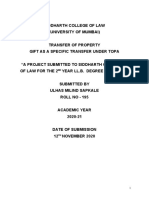drishtijudiciary(7)
drishtijudiciary(7)
Uploaded by
akkiCopyright:
Available Formats
drishtijudiciary(7)
drishtijudiciary(7)
Uploaded by
akkiCopyright
Available Formats
Share this document
Did you find this document useful?
Is this content inappropriate?
Copyright:
Available Formats
drishtijudiciary(7)
drishtijudiciary(7)
Uploaded by
akkiCopyright:
Available Formats
Gift under Muslim Law | 21 Jun 2024
Introduction
A Gift or Hiba is a transfer of property made immediately, without any exchange, by one person to another
and accepted by or on behalf of the latter.
The rules governing Hiba are derived from the Quran, Hadith (sayings of Prophet Muhammad), and various
schools of Islamic thought.
The basis of the principle of gift is the prophet’s saying, “Exchange gifts among yourselves so that love may
increase”.
The definition of Hiba or Gift has been given in Kanz al Daquiq
Essentials of a valid Gift
Declaration of Gift by the Donor:
The donor must make a clear and unequivocal declaration of the gift.
The intention to transfer the ownership of the property must be evident and must be communicated to
the donee.
Acceptance of the Gift by the Donee:
The donee must accept the gift during the lifetime of the donor.
If the donee is a minor or incapable of accepting the gift, their guardian may accept it on their behalf.
Delivery of Possession:
Actual or constructive delivery of possession must take place to complete the gift.
The donor must divest themselves of ownership and the donee must take control of the property.
Requisites and Restrictions
Competence of Donor:
The donor must be of sound mind and not a minor.
They must have the legal capacity to transfer the property.
Competence of Donee:
The donee must be capable of holding and owning the property.
Minors and persons of unsound mind can receive gifts through their guardians.
Property Must Exist:
The subject matter of the gift must exist at the time of the Hiba, future properties cannot be given as a
Hiba.
Lawful Object:
The object of the gift must be lawful under Muslim law.
Any property that is prohibited (haram) cannot be given as a gift.
Kinds of Gift under Muslim Law
Hiba-bil-iwaz (gift with exchange):
This is a gift made with a return.
In this gift, the donor gives something to the donee and, in return, receives something of approximately
equal value.
Such a gift must be registered, and an oral promise is not sufficient.
Hiba-ba-shart-ul-iwaz:
This type of gift is made with a condition of receiving something in return, if the condition is not fulfilled,
the gift may be revoked.
Delivery of possession is necessary to make the gift valid.
The gift becomes irrevocable on delivery by the donee of the iwaz(return) to the donor.
Areeat:
An Areeat is not a transfer of ownership, but a temporary license to enjoy the profits so long as the
grantor pleases.
Upon the death of donee, the property will be reverted to the donor.
Sadaqah:
A Sadaqah is a gift made with the object of acquiring religious merit.
Once the gift of Sadaqah has been made and possession has been delivered, it becomes irrevocable.
Sadaqah is not valid if it consists of an undivided share in property.
Revocation of Gift
A gift may be revoked by the donor at any time before delivery of possession.
A gift may be revoked even after delivery of possession except in the following cases:
When the gift is made by a husband to his wife or by wife to her husband
When the donee is related to the donor within the prohibited degrees
When the donee is dead
When the thing given has passed out of the donee’s possession by sale, gift or otherwise
When the thing given is lost or destroyed
When the thing given has increased in value, whatever be the cause of the increase
When the thing given is so changed that it cannot be identified, as when wheat is converted into flour by
grinding
When the donor has received something in exchange(iwaz) for the gift.
Case Laws
Hafiza Bibi v. Shaikh Farid (2011):
The Supreme Court held that an oral gift fulfilling all three essentials of a valid gift will be considered as
complete and irrevocable gift.
Mahboob Sahab v. Syed Ismail (1995)
The Supreme Court held that gift under Muslim law is not required to be in writing and consequently
need not be registered under the Registration Act, 1908.
Abdul Rahim v. Abdul Zabar (2009)
The Supreme Court held that if by reason of a valid gift, the thing gifted has gone out of the donee’s
ownership, the same cannot be revoked.
Conclusion
Hiba is a significant aspect of Muslim personal law, emphasizing the principles of generosity and support within the
community. Understanding its essentials and legal requirements is crucial for both donors and donees to ensure that
the gift is valid and enforceable. The principles governing Hiba reflect the broader values of Islamic jurisprudence,
promoting kindness and welfare.
You might also like
- Traditional Scholarship and Modern MisunderstandingsDocument193 pagesTraditional Scholarship and Modern Misunderstandingsapi-3824061100% (1)
- HIBAH (Islamic Financial Markets)Document15 pagesHIBAH (Islamic Financial Markets)Iskandar Zulkarnain KamalluddinNo ratings yet
- Week 8-9 Gifts and Wills Under Muslim Law - FLIISMDocument131 pagesWeek 8-9 Gifts and Wills Under Muslim Law - FLIISMPriyankaNo ratings yet
- Chess Is HaramDocument9 pagesChess Is Haramrevivingalislam100% (1)
- drishtijudiciary.com_to-the-point_ttp-muslim-law_gift-under-muslim-law_print=2Document2 pagesdrishtijudiciary.com_to-the-point_ttp-muslim-law_gift-under-muslim-law_print=2Vikram GuptaNo ratings yet
- GiftDocument2 pagesGiftPallavi UNo ratings yet
- Gift MPL Ll.b4 23 IjtDocument8 pagesGift MPL Ll.b4 23 IjtShan JattNo ratings yet
- Hiba Under Muslim LawDocument7 pagesHiba Under Muslim LawSourabh Yadav100% (3)
- Hiba .Gifts Under Muslim LawDocument7 pagesHiba .Gifts Under Muslim Lawna.real.8801No ratings yet
- Gift OR Hiba: Under Muslim LawDocument24 pagesGift OR Hiba: Under Muslim Lawakshay kharteNo ratings yet
- F Law AssignmentDocument11 pagesF Law AssignmentshekharNo ratings yet
- Concept of Gift Under Islamic Law: Transfer of Property Act, 1882Document34 pagesConcept of Gift Under Islamic Law: Transfer of Property Act, 1882Fazal MuezNo ratings yet
- Different Kinds of GiftsDocument10 pagesDifferent Kinds of GiftsAshok K Pandey100% (1)
- Hiba or giftDocument6 pagesHiba or giftsakshisoni51103No ratings yet
- Transfer of PropertyDocument18 pagesTransfer of Propertynitin0010No ratings yet
- Hiba - Gift Under Islamic LawDocument17 pagesHiba - Gift Under Islamic LawDisha ghorpadeNo ratings yet
- Gift (Transfer of Property Act) : DefinitionDocument5 pagesGift (Transfer of Property Act) : DefinitionSaad KhanNo ratings yet
- Family Law - II Assignment - 2k19Document10 pagesFamily Law - II Assignment - 2k19surya srivastavaNo ratings yet
- HibaDocument4 pagesHibaArpan GaraiNo ratings yet
- GiftDocument4 pagesGiftMuhammad ShehzadNo ratings yet
- Muslim Personal LawDocument43 pagesMuslim Personal LawSajad HussainNo ratings yet
- Gift (Hiba) PDFDocument21 pagesGift (Hiba) PDFShankha Shubhra ChakrabartyNo ratings yet
- GiftsDocument16 pagesGiftschetanasreenathNo ratings yet
- Unit 18 - Gifts and Will (Wasiyat) Under Muslim LawDocument7 pagesUnit 18 - Gifts and Will (Wasiyat) Under Muslim Lawhaxaniv724No ratings yet
- Hiba English Https - Blog - Ipleaders.in - Hiba-Gift-Muslim-Law - Amp 1Document12 pagesHiba English Https - Blog - Ipleaders.in - Hiba-Gift-Muslim-Law - Amp 1MD SOHRABNo ratings yet
- 6 Gift-1-1Document8 pages6 Gift-1-1amit HCSNo ratings yet
- GIFTDocument19 pagesGIFTrajputpawan1110No ratings yet
- Kinds of Gifts Under Muslim LawDocument4 pagesKinds of Gifts Under Muslim LawDILIP DESHMUKHNo ratings yet
- Essentials of Gift: Section 122 of The Transfer of Property ActDocument3 pagesEssentials of Gift: Section 122 of The Transfer of Property ActVandana BhatNo ratings yet
- Gift, HibbaDocument5 pagesGift, HibbaBhupendra SainiNo ratings yet
- GIFTDocument45 pagesGIFTUzma SheikhNo ratings yet
- Document (136)Document2 pagesDocument (136)hussainimran9647No ratings yet
- Gift or HibaDocument14 pagesGift or HibaMutasim Billah KandakerNo ratings yet
- Unit-6 FDocument9 pagesUnit-6 FKanishkaNo ratings yet
- Gift-Muslim Law HibaDocument24 pagesGift-Muslim Law Hibaayan lekhiNo ratings yet
- HibaDocument5 pagesHibaShital ModiNo ratings yet
- Fam Law 2Document39 pagesFam Law 2Oru FriendNo ratings yet
- HibaDocument15 pagesHibaamrit singhNo ratings yet
- Transfer of Property ActDocument11 pagesTransfer of Property ActAditya Dassaur100% (1)
- Transfer of PropertyDocument18 pagesTransfer of Propertynitin0010No ratings yet
- Unit III - GiftDocument35 pagesUnit III - GiftSrinath LNo ratings yet
- A Comparative Study Between Muslim Gift and WillDocument10 pagesA Comparative Study Between Muslim Gift and WillNewbieGamers - নিউবি গেমার্সNo ratings yet
- Islamic LawDocument12 pagesIslamic LawJhanvi HeeraNo ratings yet
- Gifts Under Muslim LawDocument12 pagesGifts Under Muslim LawAnanyaNo ratings yet
- Concept of Hiba Under Muslim LawDocument14 pagesConcept of Hiba Under Muslim LawHARSHIT MAHALWAL100% (10)
- Gift and WillDocument31 pagesGift and WillZobaida Khatun JulieNo ratings yet
- Family LawDocument10 pagesFamily LawRaghavendra SinghNo ratings yet
- Gift Under Islamic LawDocument5 pagesGift Under Islamic LawManpreet SinghNo ratings yet
- Explanation of GiftDocument47 pagesExplanation of GiftSohel Hossain0% (1)
- GiftDocument29 pagesGiftAnkitTiwari100% (1)
- 3 Essential Conditions GiftDocument13 pages3 Essential Conditions GiftPMG KarachiNo ratings yet
- Gifts and Wills Under Muslim LawDocument131 pagesGifts and Wills Under Muslim Lawresip58690No ratings yet
- TPADocument12 pagesTPAVishwas JorwalNo ratings yet
- GIFTDocument19 pagesGIFTrajputpawan1110No ratings yet
- GiftDocument15 pagesGiftTshewang DemaNo ratings yet
- Family Law - 2Document12 pagesFamily Law - 2ankthegoodboyNo ratings yet
- GIFTSDocument7 pagesGIFTSlegalaidkpmsolNo ratings yet
- HIBADocument9 pagesHIBAaditya.ismadovermeNo ratings yet
- Property Law - GiftDocument10 pagesProperty Law - GiftLinkesh SaravananNo ratings yet
- Tpa 12Document33 pagesTpa 12Dr. Dharmender PatialNo ratings yet
- Umrah GuideDocument2 pagesUmrah GuideIntell MasterNo ratings yet
- Hadith Safinah Nuh-Complete 2Document15 pagesHadith Safinah Nuh-Complete 2Suni ahlusunaNo ratings yet
- List of Approved Foreign Halal Certification BodiesDocument13 pagesList of Approved Foreign Halal Certification BodiesLeo Arifsandi BudiarsoNo ratings yet
- Monthly Prayer TimesDocument1 pageMonthly Prayer TimesghanNo ratings yet
- Why Do Some Legal Scholars Reject The Use of AnalogyDocument5 pagesWhy Do Some Legal Scholars Reject The Use of AnalogyAbdul Aleem100% (1)
- Nasr Hamid Abu Zayd and The Hermeneutical of Qur'An: December 2018Document26 pagesNasr Hamid Abu Zayd and The Hermeneutical of Qur'An: December 2018Ivana BozovicNo ratings yet
- Sahih MuslimDocument8 pagesSahih MuslimIzuan IqbalNo ratings yet
- Reformasi Hukum Keluarga Islam Turki: (Status Poligami Dalam Perspektif Teori Linguistik-Semantik Muhammad Shahrur)Document34 pagesReformasi Hukum Keluarga Islam Turki: (Status Poligami Dalam Perspektif Teori Linguistik-Semantik Muhammad Shahrur)Tuman BoyNo ratings yet
- Ramadan Time Table 2024 UAE, Ramadan Prayer Timings, Imsak, Seher & Iftar TimeDocument1 pageRamadan Time Table 2024 UAE, Ramadan Prayer Timings, Imsak, Seher & Iftar Timea96385553No ratings yet
- Peran Badan Wakaf Indonesia (BWI) Dalam Mengembangkan Prospek Wakaf Uang Di IndonesiaDocument22 pagesPeran Badan Wakaf Indonesia (BWI) Dalam Mengembangkan Prospek Wakaf Uang Di IndonesiaRyan HermawanNo ratings yet
- Qtys 421 Law 4 Engs New-Dec2015Document60 pagesQtys 421 Law 4 Engs New-Dec2015Richard ObinnaNo ratings yet
- Fakultas Ushuluddin Dan Pemikiran Islam UIN Sunan Kalijaga Yogyakarta E-MailDocument22 pagesFakultas Ushuluddin Dan Pemikiran Islam UIN Sunan Kalijaga Yogyakarta E-Mailparawalijasel4902No ratings yet
- 2019 Time For Prayer PDFDocument1 page2019 Time For Prayer PDFfarahhaiNo ratings yet
- 0493 Scheme of Work Paper 2 (For Examination From 2021)Document27 pages0493 Scheme of Work Paper 2 (For Examination From 2021)bilal baloshiNo ratings yet
- Indiri V Gov of Perak Case AnalysisDocument22 pagesIndiri V Gov of Perak Case AnalysisSALLY YEO YI TONGNo ratings yet
- What Time Is It? Four Signs of The Time in Our Western StoryDocument78 pagesWhat Time Is It? Four Signs of The Time in Our Western StoryAbraham AbsalonNo ratings yet
- List of Approved Foreign Halal Certification BodiesDocument13 pagesList of Approved Foreign Halal Certification BodiespungkyNo ratings yet
- How To Perform UmrahDocument1 pageHow To Perform UmrahKasimotoNo ratings yet
- Old Age in IslamDocument16 pagesOld Age in IslamAbasi kiyimbaNo ratings yet
- Shariah Fiqh N Usul Fiqh - 2Document55 pagesShariah Fiqh N Usul Fiqh - 2Cik ShueNo ratings yet
- The New York TimesDocument45 pagesThe New York TimesJuan Antonio Hernandez Lizarraga50% (8)
- Riba and Its ProhibitionDocument22 pagesRiba and Its ProhibitionwandaNo ratings yet
- 73 Sects ResearchDocument256 pages73 Sects ResearchLewis Holder100% (1)
- Wiping Over Face After DuaDocument7 pagesWiping Over Face After DuapiyushdaNo ratings yet
- Great Rewards Blog BookDocument120 pagesGreat Rewards Blog Bookhttp://AbdurRahman.org100% (1)
- 13a. Sifah Tus SalahDocument56 pages13a. Sifah Tus SalahshaziasaleemNo ratings yet
- Sahih Bukhari Aur Ilme Ghaib (Roman Urdu)Document109 pagesSahih Bukhari Aur Ilme Ghaib (Roman Urdu)Zuber MansuriNo ratings yet
- Things That Benefit The DeadDocument8 pagesThings That Benefit The Deadzaki77100% (1)

























































































